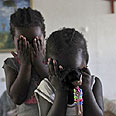
Saving Darfur refugees a mitzvah
As Jews who know what it is like to be refugees, we should be the first to help people and try to find a solution for their problems, instead of treating them like enemies
On Tisha B'Av we received two bits of good news: Interior Minister Eli Yishai decided to cancel the Hadera-Gedera law banning asylum seekers' from living in central Israel; and the government decided to postpone the deportation of the children of foreign workers and their families by three months.
Several hours later I came across a statement made by MK Yaakov Katz (National Union), chairman of the Knesset Committee on Foreign Workers. Upon being asked whether the settlements would be wiling to accept Sudanese refugees, he replied: "We don't want non-Jews in Judea and Samaria."
When I hear religious person say something like this, it makes me wonder if we read from the same Torah on Shabbat and whether we share the same history. And I refer first to Exodus 22: "And a stranger shalt thou not wrong, neither shalt thou oppress him; for ye were strangers in the land of Egypt."
I'm a native Israeli. But in the 1,878 years since the people of Israel were exiled from their land and until the State of Israel was founded, my ancestors have gotten used to hearing this sentence: "We don't want Jews in our midst."
During their exile the people of Israel have known deportation, have lived like refugees, have been closed up in ghettos and have been subjected to hatred. Have we returned to Israel and built a Jewish state only so that we can treat others like we have been treated? Is that why God brought us back to the Land of Israel?
I imagine that like every other religious Jew, MK Katz fasted on Tisha B'Av and mourned the destruction of the Temple and Israel's exile from its land. He is probably familiar with Isaiah's prophecy:
"Wherefore have we fasted, and Thou seest not? Wherefore have we afflicted our soul, and Thou takest no knowledge?'--Behold, in the day of your fast ye pursue your business, and exact all your labours. Behold, ye fast for strife and contention, and to smite with the fist of wickedness; ye fast not this day so as to make your voice to be heard on high. Is such the fast that I have chosen? The day for a man to afflict his soul? Is it to bow down his head as a bulrush, and to spread sackcloth and ashes under him? Wilt thou call this a fast, and an acceptable day to the Lord? Is not this the fast that I have chosen? To loose the fetters of wickedness, to undo the bands of the yoke, and to let the oppressed go free, and that ye break every yoke? Is it not to deal thy bread to the hungry, and that thou bring the poor that are cast out to thy house? when thou seest the naked, that thou cover him, and that thou hide not thyself from thine own flesh?" (Isaiah chapter 58)
The prophets have repeatedly warned us that no matter how much we fast and how many prayers we recite, if we do not behave justly, fairly and morally towards one another (and yes, this includes people of other nations and faiths), our worship of God is futile.
Change of attitude needed
These people have come here from countries that are facing vicious civil wars and genocide. They have escaped to many destinations, not just Israel. Africa is filled with overflowing refugee camp. Egypt is also full of refugees. Can we not share in the efforts to save them?
The UN Refugees Convention, which Israel has signed, was inspired by Jewish activists and intellectuals after World War II. But a Knesset member in the State of Israel thinks that allowing refugees into the country is a disaster. How easy it is to bound Israel with electric fences, close our eyes and forget 2,000 years of exile.
The State of Israel cannot serve as a refuge for all of the world's oppressed. We have our own needy to take care of, and this is a small country after all. But we are capable of dealing with several tens of thousands of refugees, and there are other solutions before electric fences are set up and draconian laws are passed. Agreements on sharing the load can be reached with the UN and other countries.
We can accept the refugees until the situation in their countries of origin improves and until it is safe for them to return. There are those who think that the refugees are happy to leave their homeland and culture and immigrate to Israel, regardless of the situation in their country. But those who know them know they are eager to go back to their home and their families.
But first and foremost we must change our attitude. As Jews who know what it is like to be refugees no one wants, we should be the first to help people and try to find a solution for their problems, instead of treating them like enemies we should be protecting ourselves from.
Only a few days ago we commemorated the destruction of the Temple and our people's exile. Let us uphold the words of the Torah and the prophets and live to see the rest of the prophecy fulfilled: "Then shall thy light break forth as the morning, and thy healing shall spring forth speedily; and thy righteousness shall go before thee, the glory of the Lord shall be thy rearward. Then shalt thou call, and the Lord will answer; thou shalt cry, and He will say: 'Here I am'." ((Isaiah chapter 58)










